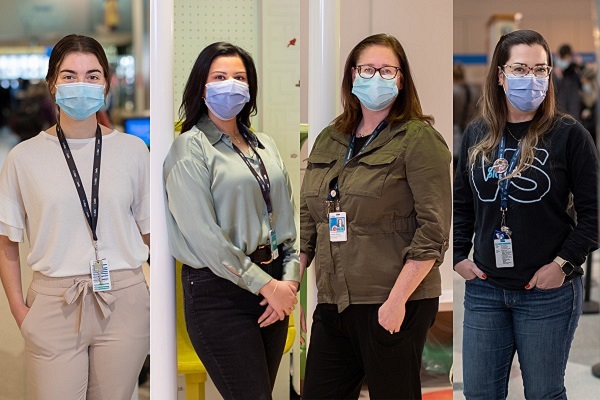
At a time that many hospitals are considering peer support programs in response to the pandemic, The Hospital for Sick Children (SickKids) recognized the benefits such a program could have for staff long before COVID-19 became part of our vernacular.
When SickKids launched its Peer Support and Trauma Response Program three years ago, there was no global pandemic in sight, but there was this sinister statistic: health-care workers are 1.5 times more likely to be off work due to illness or disability than workers from other sectors, according to a 2015 report from the Canadian Healthcare Association (now HealthCareCAN).
This longstanding issue in the health-care field was magnified by the onset of COVID-19. For those on the front line, the constant donning/doffing of personal protective equipment, compliance with physical distancing/masking, and fears of contracting/transmitting the virus, take their toll.
“From April to December 2020, we had about 12,000 contacts for Peer Support, which is an astounding number considering we would normally have a couple of thousand at most in that period of time,” says Kelly McNaughton, Program Manager, Peer Support and Trauma Response Program, SickKids. “This tells me the program’s visibility has increased and that the challenges staff face at work and at home are heightened due of COVID.”
Peer Support, which is made up of staff from diverse backgrounds and roles ranging from research, to Corporate Services (e.g., Security, Facilities, Patient Support Services), to nurses and physicians, responded quickly to the pandemic. The team established a temporary “de-stress” space in the hospital for staff to take a quick break and enjoy a snack; a roaming tea cart to offer staff a drink and wellness check-ins; on-site and virtual counselling sessions; and a dedicated “Mental Health & Wellness” resource webpage for staff.
A more recent initiative involves scheduled daily visits by two dedicated members of the Peer Support program to our screening teams, a group of front-line workers who are charged with ensuring compliance with pandemic protocols upon entering SickKids. These two peers are on hand twice-daily for an hour to offer triage and direct “in-the-moment support.”
Perhaps the most important resource is how to connect with the dedicated and compassionate group of 76 trained Peers within the program itself, supporting staff across the SickKids campus whether they work in clinical/non-clinical areas, research or learning.
“Without Peer Support during COVID, there’s a good possibility many staff who needed help may not have received it,” Kelly says.
How Peer Support makes a difference is acting as a friendly and trusted gateway to support. Instead of having to figure out which way to turn on their own, people are much more likely to turn to a Peer because of the common ground they share at SickKids – an understanding of the culture, environment, potential stressors and psychological demands.
SickKids’ Peer Support program is not only attracting attention inside SickKids but outside too. In recent weeks, Kelly has been contacted by hospitals in Ontario, the U.S. and the Bahamas to learn more about what’s involved in setting up a program. Here are her top three tips:
- Dedicate someone to manage the program – it’s not something that can be run from the side of one’s desk.
- Secure adequate funding and ensure the right infrastructure is in place.
- Recruit and train Peers who are in this for their colleagues and not themselves – not everyone is equipped to handle the heavy topics staff open up about.
Dr. Gino Somers is the Division Head of Pathology at SickKids and a physician Peer. During a difficult time in his career, he engaged the support of his colleagues before there was a formal peer program. He credits them and their ability to understand the challenges of an academic hospital environment for lifting him back up again.
“After this episode, I was drawn to ‘peer support’ as a way of helping those who have suffered psychological trauma, disappointment or who just need to talk, and I love the idea of listening to people and helping them through a difficult period,” Gino says. “My involvement with the Peer Support program has really put me back in touch with why I became a doctor in the first place.”
Kelly notes that many volunteer to be a Peer, but like any job, it’s not for everyone. Some are interviewed and not invited to training; some are recruited and discover it’s not a fit for them. “The Peers themselves are the critical factor and we’re fortunate to have an exceptional group at SickKids,” Kelly says. “Even more important than training is the recruitment of a genuine and authentic complement of Peers. They are responsible for the program’s credibility and, ultimately, its success.”

